Early period
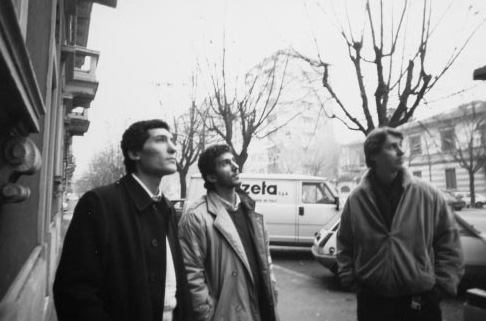
Banana Joker, Alberto Petrossi and Mattia Giorgietti
Founded from the initiative of Banana Joker, Emisfero Boreale was formed in 1978 within the “Collettivo di Iniziativa Musicale” of Milan, a project of musical and cultural aggregation, active since 1977 and in which two other musical groups gravitated, including the group “Divieto di Sosta Expedition” of which Banana Joker himself was a part.
The first line-up of Emisfero Boreale included Banana Joker (12-string acoustic guitar and rhythm guitar), Paolo de Simone (electric guitar), Maurizio “Icio” Petrossi (electric guitar, bass and drums) and occasionally Diego Pasini (drums).
A few months later, the group brought together two other members of the “Collettivo di Iniziativa Musicale”: Alberto “Pepè” Petrossi (bass guitar) and Mattia Giorgietti (electric guitar), who together with Banana Joker would form the nucleus of the group until it disbanded in 1993.
Between 1978 and 1981, the basic line-up consisting of Banana Joker (12-string acoustic guitars, electric guitar and keyboards), Mattia Giorgietti (electric guitar, keyboards, Roland GR500 synth guitar) and Alberto “Pepè” Petrossi (electric bass). Different formations would alternate in the first period. These included: Marco Olgiati (percussions and drums), Maurizio Donà (drums), Fatima Ahmed (vocals), Pippo Asta (flute and sax), Stefano Castoldi (drums) and Maurizio “Icio” Petrossi (electric guitar).
The debut concert took place in the era of “sei politico” (a political initiative of the students movement), in a crowded auditorium of the IPS “Cesare Correnti”; the band performed using acoustic and electronic sounds and including “experiments” such as an “electronic” edition of a hypothetical TG2 (TV news) of the future.
Emisfero Boreale subsequently performed mainly at popular festivals or in high school halls, often with the participation of Chus Fernandez (electric bass), a Spanish bass player with recording experience in the progressive rock and jazz area, and Diego Pasini (drums).
At the same time the group undertook its first experiences in the recording studio with the musical consultancy of William Marino, guitarist and expert in electronic music who had already established himself through his involvement in various Italian record productions and who had also played lead guitar in a couple of songs.
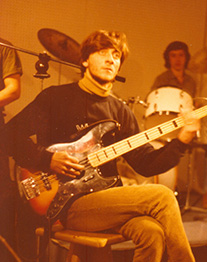
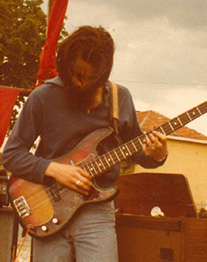
The Italian Rock Canterbury
In 1981 Emisfero Boreale proposed a new line-up with the introduction of Enrico Ferraresi (drums) and Nicola Calgari (sax) to complete its own musical project inspired by groups such as Gong, Hatfield and the North, Caravan and National Health and with the intent to implement an Italian version of Rock Canterbury.
With this change Emisfero Boreale renewed its sound and presented a new original project, which was, at the same time, partially unrelated to the Italian progressive rock music of that period.
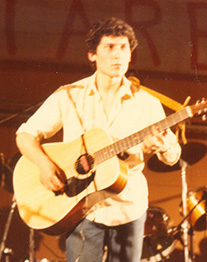
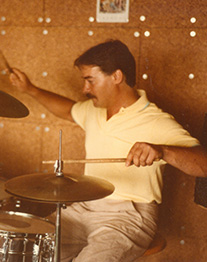
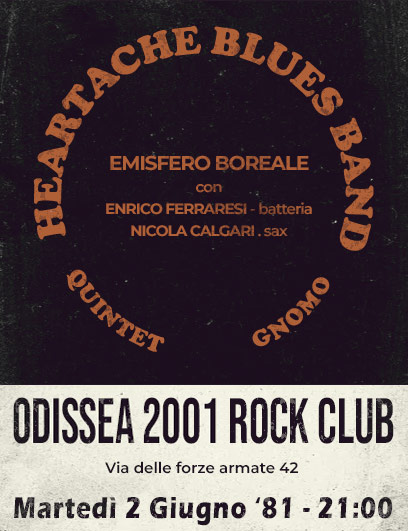
The debut concert of the new line-up took place at the Odissea 2001 (well-known Milanese club of those years) with a good response from the critics.
That concert was also published in a bootleg on compact cassette, almost entirely played live. It was entitled “Nuova Civiltà Anno Zero” (1981), and also included two songs recorded in the studio, as well as the most requested song at live concerts – “Pulsazioni”. The two songs recorded in the studio also featured Marco Scacchetti (drums) and Cesco La Macchia (keyboards).
Much of this material would later be included in the self-produced “Belfast” CD in 2002.
Around mid-1982, with the permanent entry of Piero Pallotta (drums) and with the collaboration of Chus Fernandez (electric bass and percussions) and the occasional amicable participation of Mario Arcari (oboe, flute and sax), Emisfero Boreale began to work in the studio, recording the song “Belfast” for the creation of an official album (which would be released as a bootleg and then on a self-produced CD).
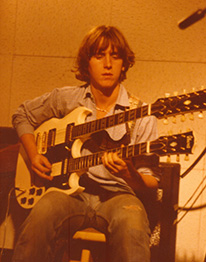
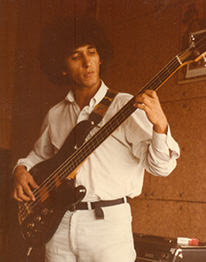
The last years of the first period
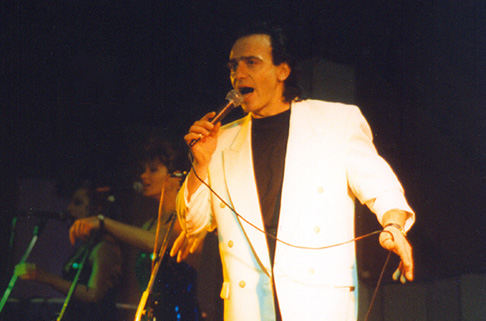
The official record project faced several delays. In 1982, with the presence of Claudio Parente (vocals), temporarily in Italy from Australia, the musical genre changed thanks to the addition of more electronic sounds and the introduction of pop rock which was actually sung.
A second bootleg was therefore created: “Rumours from the sky”. It was then republished in 2002 with a self-produced CD. The group subsequently abandoned the concerts at popular festivals in favor of regional television shows like “Telecity” and “Antenna Tre” (go to the historical archive), as well as taking part in various broadcasts hosted by Teo Teocoli, Giorgio Faletti and the “Gatti di Vicolo Miracoli”, including “Dire Fare Baciare”.
This activity continued until the end of 1986.
The subsequent musical productions of “Emisfero Boreale” essentially became electronic studio productions, such as “Future is Bright” made with William Marino and Claudio Parente in Melbourne, Australia, which later became a demo-song of Yamaha instruments (DX7 and QX3) at the SIM of 1989 (Musical Instrument Fair in Milan) and which anticipated what would later be the solo activity of Banana Joker.
In the years that followed, the group devoted itself mainly to studio activity and was simultaneously forced to abandon live concerts. These were years in which there was a greater interest in dance music and new genres such as punk. At the same time the interest in prog music decreased in favor of a more pop feel and electronic sounds. At the same time, music producers organized fewer live concerts and popular festivals; and this – not only for Emisfero Boreale, but also for other more important artists – caused many difficulties in keeping their musical identities alive.
In 1993, after fifteen years on the music scene, the band broke up. Only Banana Joker ventured on his own in Australia, via Claudio Parente’s Clap Records & Promotions, the groundwork having already been partly laid by the latest productions of the group.
The first 2 CDs of Emisfero Boreale
In 2001, about 8 years after the band dissolved, Banana Joker, Alberto “Pepè” Petrossi and Piero Pallotta took care to recover the musical material of “Emisfero Boreale“ which comprised the studio sessions and live performances of the band, from the late 1970s to the late 1980s.
In the same period the idea of re-forming the band and making a new CD was considered but it was not possible to reunite the original group due to the various commitments of the members. In the meantime both Piero Pallotta (on the “Eleven Eleven” CD) and Alberto “Pepè” Petrossi (on the “Beyond the Silence” CD) have collaborated with Banana Joker as instrumentalists in his solo CDs.
The band published 2 CDs respectively titled “Belfast” and “Rumours from the sky” and included collaborations with important musicians and friends such as Enrico Ferraresi, Mario Arcari, Nicola Calgari, Chus Fernandez, Claudio Parente and William Marino. The CDs were self-produced and released in July 2002.
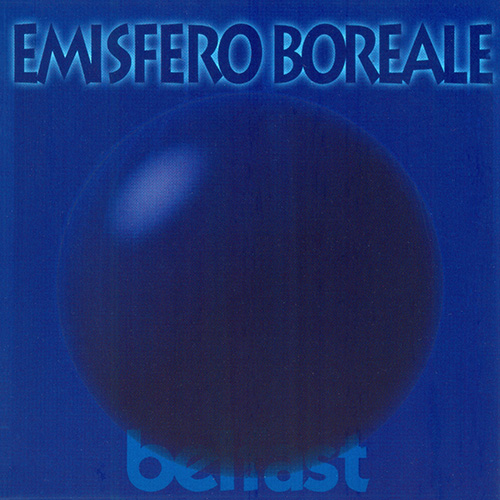
Staying in the milanese music underground scene
Emisfero Boreale, together with many Milanese bands among which we also like to remember “Civiltà Mediterranea” and “Quintet”, represented one of the most constant expressions of Milanese youth musicality between the end of the ’70s and the end of the ’80s. The musical genre was predominantly instrumental and the presence of sung pieces was only sporadic, at least until the arrival of Claudio Parente in 1982.
Despite some timid but concrete proposals from record companies, the group has always placed itself in the underground musical scene, often avoiding evolutions towards scenarios of greater visibility – at least until 1983, the year when the group began to make some television appearances.

The idea was to “play” mainly in popular and youth festivals and to be part of the Milanese artistic, musical and cultural undergrowth, trying to present its musical project without interference, in full autonomy and with little propensity to compromise even relatively the contexts in which to perform.
The realization of not being able to add anything comparably relevant to the abundant musical offerings of the time, together with a lack of development and artistic maturation, if only partially desired, kept the group in the youth underground until its dissolution in 1993.
Emisfero Boreale & Friends 2022
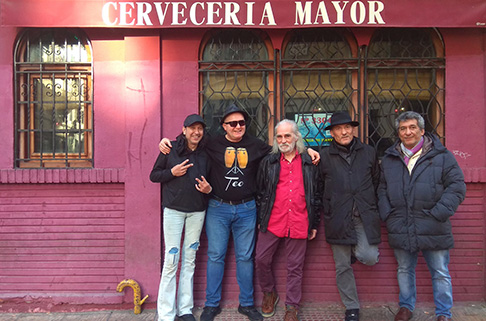
One evening in 2019 in Zaragoza (Spain), 26 years after the group officially disbanded, Chus Fernandez, Alberto “Pepè” Petrossi and Banana Joker developed the idea of temporarily recreating “Emisfero Boreale” and making an official album: “Pulsazioni”.
Recordings began in Zaragoza in December 2019, immediately involving guitarist Chiche Sosa and percussionist Teodoro Romero Escudero.
Some old songs from the band’s original repertoire were revived. These included: “Pulsazioni”, “La Rottura della Sfera di Cristallo”, “Nuova Civiltà Anno Zero”, “Arkonis” and “Emisfero Boreale”.
With the outbreak of the Covid-19 epidemic, what was to be the initial project had to undergo many changes.
Banana Joker returned from Cuba a few days before the start of lockdown. He wrote the song “Lockdown” immediately, and “Hasta la vista amigos” in the following weeks.
Old friends Nicola Calgari, Enrico Ferraresi, William Marino and Amerio Pace enthusiastically joined in the creation of “Pulsazioni”. Maurizio Giannotti (New Mastering Studio) subsequently made himself freely available for the final stage of mixing and mastering of the album.
It was therefore in this simple and spontaneous way that Emisfero Boreale was reunited and the album “Pulsazioni” was born.